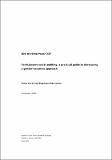| dc.description.abstract | A participatory approach to codes of labour practice comes from a different perspective to more
compliance focused snapshot social auditing. It puts greater emphasis on involvement of workers and
workers organisations in the process of code implementation and assessment. It is based on developing
partnerships between different actors (companies, trade unions, NGOs and preferably government) in
developing a locally sustainable approach to the improvement of working conditions. This approach is
sensitive to uncovering and thus addressing more complex issues such as gender discrimination and sexual
harassment. These are issues more likely to be experienced by insecure non-permanent workers, who are
often women, whose voices snapshot audits usually fail to pick up. They are less visible issues, that
are unlikely to be resolved through a simple compliance approach. The goal of a participatory approach is
a process of awareness creation and improvement that is more gender sensitive.
A participatory approach can be developed at different levels. At a minimum it involves the use of
participatory tools in the process of social auditing to ensure that the views and voices of workers,
especially women workers, are captured in an audit. More genuine participation by workers also requires
the involvement of workers representatives or shop stewards at site level, and sector trade unions and
NGOs, both in awareness creation and auditing process. At its broadest level, it involves the development
of local multi-stakeholder initiatives that bring companies, trade unions and NGOs together with
government in forming an independent body able to oversee the implementation, and monitoring of a
locally relevant code of labour practice. Such an approach faces many challenges, but it represents a shift
away from a formal top down compliance orientation, to the greater empowerment of workers and their
representative organisations as an essential part of the process of improving labour standards and working
conditions.
This paper is aimed primarily at policymakers and practitioners with a practical interest in developing
a gender-sensitive approach to participatory social auditing and codes of labour practice.
Keywords: codes of labour practice; participatory social auditing; gender. | en_GB |

